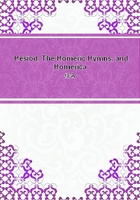
第83章 THE HOMERIC HYMNS(25)
(24) Cronos swallowed each of his children the moment that they were born, but ultimately was forced to disgorge them.
Hestia, being the first to be swallowed, was the last to be disgorged, and so was at once the first and latest born of the children of Cronos. Cp. Hesiod "Theogony", ll. 495-7.
(25) Mr. Evelyn-White prefers a different order for lines #87-90than that preserved in the MSS. This translation is based upon the following sequence: ll. 89,90,87,88. -- DBK.
(26) `Cattle-earning', because an accepted suitor paid for his bride in cattle.
(27) The name Aeneas is here connected with the epithet AIEOS(awful): similarly the name Odysseus is derived (in "Odyssey" i.62) from ODYSSMAI (I grieve).
(28) Aphrodite extenuates her disgrace by claiming that the race of Anchises is almost divine, as is shown in the persons of Ganymedes and Tithonus.
(29) So Christ connecting the word with OMOS. L. and S. give =OMOIOS, `common to all'.
(30) Probably not Etruscans, but the non-Hellenic peoples of Thrace and (according to Thucydides) of Lemnos and Athens.
Cp. Herodotus i. 57; Thucydides iv. 109.
(31) This line appears to be an alternative to ll. 10-11.
(32) The name Pan is here derived from PANTES, `all'. Cp.
Hesiod, "Works and Days" ll. 80-82, "Hymn to Aphrodite" (v)l. 198. for the significance of personal names.
(33) Mr. Evelyn-White prefers to switch l. 10 and 11, reading 11first then 10. -- DBK.
(34) An extra line is inserted in some MSS. after l. 15. -- DBK.
(35) The epithet is a usual one for birds, cp. Hesiod, "Works and Days", l. 210; as applied to Selene it may merely indicate her passage, like a bird, through the air, or mean `far flying'.
HOMER'S EPIGRAMS (1)
I. (5 lines)
(ll. 1-5) Have reverence for him who needs a home and stranger's dole, all ye who dwell in the high city of Cyme, the lovely maiden, hard by the foothills of lofty Sardene, ye who drink the heavenly water of the divine stream, eddying Hermus, whom deathless Zeus begot.
II. (2 lines)
(ll. 1-2) Speedily may my feet bear me to some town of righteous men; for their hearts are generous and their wit is best.
III. (6 lines)
(ll. 1-6) I am a maiden of bronze and am set upon the tomb of Midas. While the waters flow and tall trees flourish, and the sun rises and shines and the bright moon also; while rivers run and the sea breaks on the shore, ever remaining on this mournful tomb, I tell the passer-by that Midas here lies buried.
IV. (17 lines)
(ll. 1-17) To what a fate did Zeus the Father give me a prey even while he made me to grow, a babe at my mother's knee! By the will of Zeus who holds the aegis the people of Phricon, riders on wanton horses, more active than raging fire in the test of war, once built the towers of Aeolian Smyrna, wave-shaken neighbour to the sea, through which glides the pleasant stream of sacred Meles; thence (2) arose the daughters of Zeus, glorious children, and would fain have made famous that fair country and the city of its people. But in their folly those men scorned the divine voice and renown of song, and in trouble shall one of them remember this hereafter -- he who with scornful words to them (3)contrived my fate. Yet I will endure the lot which heaven gave me even at my birth, bearing my disappointment with a patient heart. My dear limbs yearn not to stay in the sacred streets of Cyme, but rather my great heart urges me to go unto another country, small though I am.
V. (2 lines)
(ll. 1-2) Thestorides, full many things there are that mortals cannot sound; but there is nothing more unfathomable than the heart of man.
VI. (8 lines)
(ll. 1-8) Hear me, Poseidon, strong shaker of the earth, ruler of wide-spread, tawny Helicon! Give a fair wind and sight of safe return to the shipmen who speed and govern this ship. And grant that when I come to the nether slopes of towering Mimas I may find honourable, god-fearing men. Also may I avenge me on the wretch who deceived me and grieved Zeus the lord of guests and his own guest-table.
VII. (3 lines)
(ll. 1-3) Queen Earth, all bounteous giver of honey-hearted wealth, how kindly, it seems, you are to some, and how intractable and rough for those with whom you are angry.
VIII. (4 lines)
(ll. 1-4) Sailors, who rove the seas and whom a hateful fate has made as the shy sea-fowl, living an unenviable life, observe the reverence due to Zeus who rules on high, the god of strangers;for terrible is the vengeance of this god afterwards for whosoever has sinned.
IX. (2 lines)